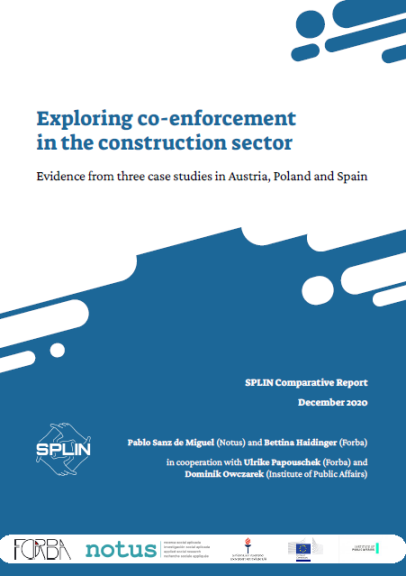The effectiveness of traditional labour inspector¬ates’ and social partners’ instruments to generate and enforce labour standards are limited when businesses make a strategy of depriving workers of their rights, using complex and transnational business models to exploit regulatory loopholes and undermine fair competition. Hence, strategic and innovative practices are needed to make the enforcement of labour standards more effec¬tive, especially in sectors with a high incidence of precarious employment and noncompliance. One promising way forward is the potential contri-bution of co-enforcement actions undertaken by worker and/or employer organisations together with labour inspection institutions to safeguard minimum labour standards.
The SPLIN report relies on an original research line on co-enforcement which incorporates the poten¬tial contributions of worker and employer organ¬isations for co-enforcing labour standards jointly with national labour inspection institutions. This approach seems to be particularly promising in a context where labour inspectorates in many coun¬tries face budgets constraints entailing insuffi¬cient resources and where trade unions’ power has declined. Co-enforcement has inferred a number of mechanisms which justify the relevance of this approach and highlight its specificity compared with traditional enforcement approaches: the non-substitutable elements of state and society; strategic enforcement; routinising the flows of information between state and society; and the need for political support within state and social partner organisations.
This comparative report analyses and compares co-enforcement actions developed at national (Austria and Poland) and regional level (Spain) in three different countries in the construction sector. These actions aim to ensure fair working conditions, and to prevent and to tackle fraud. The report reflects the design, development and impact of the following cases:
• Construction Workers’ Holiday and Sever¬ance Payment Fund (Bauarbeiter-Urlaubs- und Abfertigungskasse, BUAK) in Austria.
• Institutionalised cooperation between the Asturian regional offices of the Spanish National Labour and Social Security Inspectorate (Comi¬sión Territorial del Principado de Asturias de la Inspección Nacional de Trabajo y Seguridad Social) and the Asturian sectoral social partners through the Commission on Health and Safety and Hiring Prevention (Comisión de Seguridad y Prevención de Riesgos Laborales y Contratación, COPREVAS) in Asturias, Spain.
• A set of three agreements: Agreement for Safety in Construction (Porozumienie dla Bezpieczeństwa w Budownictwie, ASC); Agree¬ment on Minimum Wages in Construction (Porozumienie w Sprawie stawki minimalnej w Budownictwie, AMW); and
Agreement for Occupational Safety in the Operation of Cranes (Porozumienie na Rzecz Bezpieczeństwa Pracy przy Obsłudze Żurawi, AOSOC) in Poland.
The comparative report summarises the key results and conclusions drawn during a two-years international research project entitled “SPLIN, Fair working conditions: exploring the contribution of cooperation initiatives between Social Partners and Labour Inspection authorities”
Description of the project The project is co-financed from the European Union Funds, budget heading ‘Improving Expertise in the field of Industrial Relations’. Grant agreement number: VS/2019/0080.



